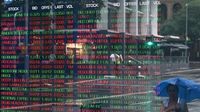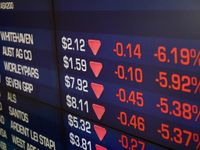In a dramatic turn of events, the Australian share market experienced a staggering plunge of $178 billion on Monday, April 7, 2025, following the announcement of new tariffs by the United States. The market suffered a 6.4 percent drop within the first ten minutes of trading, marking the worst opening since the onset of the COVID-19 pandemic five years ago. This sharp decline has raised concerns about the future of the Australian economy and its ties to global financial sentiment.
Donald Trump, the American President, offered a stark piece of advice amidst the chaos, stating, "Sometimes you have to take medicine to fix something," while aboard Air Force One. His comments came as the financial markets reacted negatively to the broad-based tariffs, which included a 34 percent levy on China and a 10 percent tariff on Australia. As a result, key sectors such as banking, technology, and mining were hit hard.
The benchmark S&P/ASX200 index fell to 7,11.30 points, with significant losses recorded across major stocks. The Commonwealth Bank of Australia, the nation’s largest home lender, saw its share price plummet by 8.5 percent to $140.90. Similarly, mining giant BHP experienced a drop of 9.13 percent, falling to $33.46, while Fortescue Metals Group shed 9.02 percent to $13.51.
Tech stocks were not spared either. Life360, a popular tech company, plunged by 10.99 percent to $16.10, while ZipCo, which had been the best performing stock in 2024, saw its share price drop by 12.45 percent to $1.12. These declines reflect a broader trend, as the Australian dollar fell below 60 US cents for the first time since March 2020, igniting fears of rising inflation due to more expensive imports.
Market strategist Michael McCarthy from Moomoo noted that the Australian dollar's decline indicates a serious crisis. He stated, "The Aussie dollar, if nothing else, is signalling we are in crisis mode already." He further explained that the tariffs imposed by the US have raised global recession fears, evoking memories of stagflation in the 1970s, a period characterized by high inflation and unemployment.
McCarthy emphasized the implications of these tariffs, saying, "It's the tariffs - there's no two ways about it. The concern here is stagflation, and the tariffs feed both sides of that equation in that tariffs increase prices, lifting inflation, and also gum up the global economy." He added that financial markets now perceive a global recession as a real possibility, estimating a better than 50 percent chance of economic downturn.
The fallout from the new tariffs has not only affected the Australian market but has also led to a significant drop in global markets. On the previous Friday, the benchmark S&P 500 in New York plummeted by six percent, setting a negative tone for the Australian Securities Exchange. McCarthy warned that growth-exposed stocks, particularly in technology and minerals, are likely to face severe pressure as the market reacts to these developments.
Despite the overall market turmoil, some sectors showed resilience. Coles and Woolworths, two of Australia's major supermarket chains, initially bucked the downturn, but by Monday morning, Woolworths had fallen 2.38 percent to $30.39, and Coles dropped 2.08 percent to $20.69.
Investors are now left grappling with the implications of these tariffs on the Australian economy. The Commonwealth Bank's share price has fallen more than 7 percent since February 13, 2025, while the S&P/ASX 200 Index has dropped by 10 percent over the same period. The uncertainty surrounding US trade policy has cast a shadow over the Australian market, leading to speculation about the future performance of various stocks.
Analysts have pointed out that the tariffs could lead to a decline in demand for Australian commodities, particularly iron ore, which is crucial for the country’s economy. The potential for lower demand from China, coupled with the ongoing tariff pressures, raises concerns about the sustainability of Australia’s economic growth.
In light of these developments, some investors are questioning whether it is time to buy shares in companies like the Commonwealth Bank, which, despite its recent decline, is still considered a key player in the financial sector. However, others argue that the current market conditions may present better opportunities elsewhere, particularly in stocks that have experienced deeper declines.
As the situation evolves, the focus will remain on how the Australian market adapts to the new economic landscape shaped by the US tariffs. With global sentiment under threat and fears of a recession looming, investors will need to navigate these turbulent waters carefully.
In conclusion, the Australian share market's significant plunge serves as a stark reminder of the interconnectedness of global economies. As the ramifications of Trump's tariffs unfold, both investors and policymakers will be watching closely to gauge the long-term effects on economic stability and growth.







